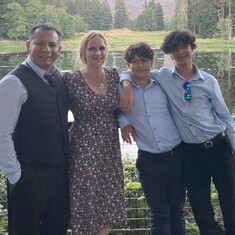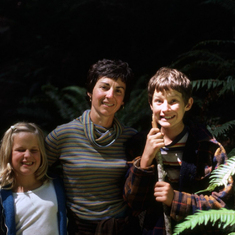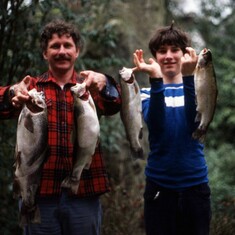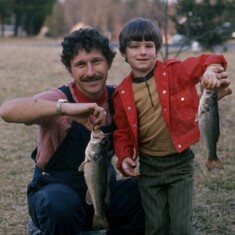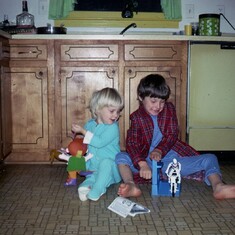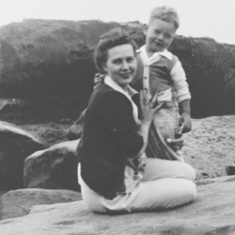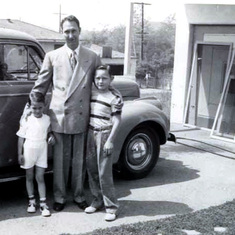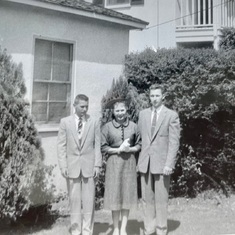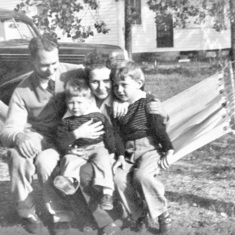I remember how encouraging and supportive Ed was of me, often shouting “You’re doing great!” as he departed my office. Two months after I started my position at UCSB, Ed invited me on a field trip to see the devastation in Montecito following the enormous debris flows that shocked that community. This field trip startlingly jumpstarted my understanding of the local geology and geomorphology, where we saw boulders the size of living rooms in the middle of the road. Ever since that trip, Ed would cry out to me “You’re the leader of the debris flow group! Keep up the good work!”. I hardly knew much about debris flows when I started our collaboration, but this quickly changed after Ed assembled a debris flow team (which I was apparently the leader of) that included students and professors from all across campus and the local community. I learned a great deal about fundamental processes in debris flow geomorphology and local geology through this team that Ed fostered. During this time, I came to realize Ed’s generous, positive spirit and hear stories about the generations of geologists and geomorphologists who were inspired by his books and teaching. I will miss his short bursts of encouragement and signature laugh echoing down the hallways of Webb. I’m sorry that I never got to express to Ed how grateful I am to have been able to share my first few years at UCSB as his colleague and collaborator.
- Kristin Morell
Many undergraduate students knew Ed Keller as the River Whisperer. He began his courses with a poem he wrote about listening to a river speak to him and I remember thinking, wow this man really just sits and watches rivers all day long, but I soon learned he was just one of the most observant people I’ve ever met. Out of all my classes, he taught me to approach Earth Science in the most diverse and special way. I was inspired by his passion, and his love of teaching was reflected in his care for his students. I’m grateful to have heard all his stories which became an every class occurrence, and his occasional shout of “RIVERS!” in between sentences. His love of teaching was reflected in his care for his students.
He talked up rivers so much that after taking a class with him, I always take a second to sit and watch a river or any sort of running water I come across to see if it’ll tell me anything. Though I’m usually completely unsure of what it’s telling me, it always seems to clear my mind and provide me with a nice view. I thank him for this new appreciation :)
- A Fall 2021 undergraduate student
Ed was a warm and exuberant colleague. I remember shortly after I was hired, he greeted me in the hallway with a "Glad you are here! Welcome! Haha!" and then paced off quickly, doubtless to finish another book. In faculty meetings, he maintained an attentive and enthusiastic commentary, murmuring in appreciation at the proceedings. Other folks’ reminiscences about Ed offering to look into hazards at their houses jogged my memory that when we were looking to buy and I wasn’t sure about whether a prospective property was sliding down the hill (spoiler: it was) my first port of call was, of course, Ed. He sent me tons of useful resources and took the time to walk me through the most important considerations. I was awed by the simultaneous depth and practicality of his wisdom about the land. His sense of wonder and fascination with the natural world shone through in every interaction, and both our field and department will miss him greatly.
- Zach Eilon
I remember how welcoming and kind Ed was to me when I was a new assistant professor. He would stop by my office to chat, always cheerful, always sweet and encouraging, sharing with me stories about his latest research project. Later, when I was chair, I gave faculty a list of department committees and asked that they indicate which they were willing to serve on. Ed volunteered for every one! I also remember how much Ed cared about his students and about sharing with them his love of environmental geology. When he heard that my older son was interested in natural history, he gave him a copy of his book on the natural history of Santa Barbara. My son loved that book and carried it with him everywhere he went; it is now dog-eared and dirty. I credit that book for inspiring my son’s great love for the Santa Barbara landscape.
P.S. I have to follow up on Zach’s reminiscences to add that I too remember Ed’s murmurs of appreciation, not only in faculty meetings, but also in our weekly department seminars. Sitting next to Ed through one of those talks meant that you had a constant soundtrack indicating what was particularly interesting (“hmmm”), amusing (chuckle), or awe-inspiring (“wow”). It always put a smile on my face.
- Susannah Porter
Ed unyieldingly accentuated life’s positives. As his across the hall office neighbor for many years, I never ceased to marvel at the full-throated “O-KEY-doe-KEY” that would announce his preparations for wrapping up another joyful day. His optimism and spirit will be deeply missed.
- Andy Wyss
Ed was one of those people who could simply bring a smile to your face. He always had a kick in his step and a positive attitude that would bring joy to your day. As I was researching graduate programs in geology, I came across Ed’s research and was fascinated by his diverse academic background. His ever-growing curiosity and desire to learn was something I will always remember him by. Ultimately, he introduced me to the world of geology and kickstarted my graduate school experience here at UCSB. I remember during our meetings he would always conclude with words of encouragement despite the hardships that were present. Ed’s mentorship and support provided me with a foundation in both geology and graduate school that allowed me to further grow and develop as a student. I am forever grateful to have been his graduate student and appreciate all the insight he provided me. His outlook and attitude always provided me with a sense of calmness, and I will greatly miss this. Thank you for everything, Ed.
- Ryan Owings
Ed and I joined the faculty the same year. I agree, big time, with the comments about his enthusiastic and friendly demeanor. Later in our relationship, we lived within a quarter mile of each other on Las Canoas Ed and would stop and chat when he was in the yard as I cycled by on my way to Mountain Drive. I was fascinated with his ability to write a book by recording the text, having it typed, then he edits it and supplies figures, and voila! a top-rated text is born! As interest in the local debris flows increased, he visited our yard, which has a wealth of exposed rocks (one 4’ high), and described the surfaces and what they told us about their ages, 50 or 60 kyrs. I’ll miss you, Ed. You were a beloved local storyteller with loads of fascinating info about our neighborhood.
- Bill Prothero
Ed was always super enthusiastic and upbeat. I used to illustrate the things he would say during classes and came up with some great cartoons. He believed anyone could do anything and never let anything hold him back.
- Sarah Paschal Gerenday
Ed was a highly creative and modest thinker. His early papers on Areal sorting of Bed Load (1971) and presentation of the Velocity-Reversal hypothesis (1971) are still discussed more than half a century later. Ed always made people feel calm and welcomed; never heard him utter a negative word although he certainly had informed opinions that he would defend in a scholarly way, never putting anyone with a contrary view down. The world has lost a great scientist and a warm human being.
- Frank Spera
When our house was sliding down the hill in 1998, a series of professional and academic geologists visited and pronounced that we either were doomed or would need to pay >$100k to save the house. Ed came by, had a quick look around, and announced a simple solution that I carried out myself and cost <$200. Taking the time to help a colleague and come up with an elegant solution is emblematic of Ed’s compassion for others as well as his deep practical knowledge.
- Anonymous
Ed was a kind man with always a good positive energy about him. When I was new to the department I felt excitement to be a part of this world of science. I was browsing through a bookstore in Montecito village one day and Bam ! there was his name Edward Keller, with a big smile I told my wife Lauren I know this guy. That was the first of many publications of Ed’s that have caught my eye. I would go to his office and talk about some of his books. Although I am a staff member and not an academic he always invited me in to chat and never made me feel like I was wasting his time. He loved to talk about his science in a way that this guy could understand.
Thank you for all the valuable time you have given me.
- Timothy J. Cuellar
Ed and I had discussions on all kinds of topics. I was never afraid to ask Ed a question about geological topics. I knew he would be thoughtful and kind in his response. He helped me determine if radon were an issue at my house. We talked about propagating folds (one near my house) and one associated with the 1952 Kern County earthquake. He told me what to look for as signatures of the Arroyo Parida fault as it crosses Santa Barbara. Ed was a kind gentleman. I will always remember his asking if my son and I would like to go fishing in the SB Channel on his boat. We did not catch anything, but being there watching dolphins was special. Ed was special.
- Ralph Archuleta
Ed provided one of the warmest welcomes I received in the Department. Several times he stopped me in the hallway and told me how happy he was that I moved to Santa Barbara. When I was house hunting and had finally found a place to buy, Ed offered to have a look around and let me know if there were any obvious hazards I should be aware of (fortunately, there were not). He generously shared a copy of his book about Santa Barbara and pointed me to the on-line geologic map of Santa Barbara, which was incredibly helpful. He was a legend in the local community through his outreach efforts (e.g., the column he wrote in the News Press). When I told my next-door neighbor that Ed was a colleague of mine, he told me of his adoration of Ed. I was able to have Ed and family around for a BBQ and make introductions – my neighbor was over the moon. I will really miss his positivity
- Roberta Rudnick
Ed loved to talk in the hallway and discuss the latest projects he was working on. I enjoyed this interaction with Ed because it gave me insights into a realm of Earth Science research outside of my own, and because these insights were delivered with Ed’s characteristic enthusiasm. These chats in the hallway often yielded great bits of advice: whether or not our faculty housing home had any natural hazards of concern; the best way to approach financing a year-long sabbatical outside of the USA; how to approach teaching Earth 20 (and he even provided me with a treasure trove of lecture materials to get me going). And, unfailingly, he would ask me how I was doing, and it was always clear that he wasn't just asking me to be polite: he really cared. Ed was an inspiration. He was kind, helpful, and perpetually positive. And I miss him.
- Matt Jackson
I will miss Ed! Over the many years that I knew him and served with him on the faculty, I never heard him say an unkind word about anyone. He was always so upbeat, and so enthusiastic about his work and hobbies. He was also generous with his time and knowledge. Whenever I approached him with questions about geology, rivers, hydrology, fish, or any other aspect of his expertise, I was sure to get a wealth of great information. He was a gracious soul that I am grateful to have known, and sad to lose. I will always be cheered by my memories of his ready laugh and the twinkling of his eyes.
- Rachel Haymon
Ed was full of pleasant surprises. When we first moved into our new house, he and his former wife showed up to help us unpack. They were the only ones. My recollection is that this was unannounced. On occasion, we talked about fishing, one of his loves. He took me offshore Santa Barbara in his outboard and we fished. I don’t remember if I caught anything, but Ed sure did. He was a big booster of research of my students and me on the tectonic rotations in greater Southern and Central California. It was at a time when I was getting huge pushback on that research from the established geological community. He started writing textbooks and I was floored that he dictated book paragraphs for the front office to transcribe. Try even thinking of one paragraph some time to see how hard that is. I remember Ed as being upbeat and cheerful, with an almost childlike laugh, full of innocence and uninhibited. At one time we spoke of retirement, and he told me he had no plan to do that; he was having too much fun. Thank you Ed.
- Bruce Luyendyk
I really enjoyed having an office across the hallway from Ed, he loved sharing his latest findings and inquiring about what I was working on. I also had a good time with Ed trying to catch fish from his boat out in the channel. He invited the late Professor Redge Gollege to join us, who had become blind from a long illness. It took a lot of care to make sure Redge would be safe out on the channel, one of many examples of Ed’s kindness.
He was a wonderful colleague and a true mensch. I will miss you Ed.
- Ken Macdonald
Ed was the first professor I met when I arrived at UCSB as a PhD student, and I remember immediately being taken away by his kindness and his passion for research. He was always excited to talk about a new idea or method, especially if it pertained to the local geomorphology. I was lucky to have him as one of my committee members and there was not a single meeting where he did encourage me and tell me that I was doing a great job. That encouragement meant a lot to me and had me coming out of those meetings feeling genuinely positive… certainly important for any grad student. For that, and all of the great advice and ideas you gave me Ed, Thank you. You will be greatly missed by us all.
- Nick Harrichhausen
Ed was always observant and ready to engage in conversation over a broad range of subjects. As many have noted, his expertise in landforms and flowing water was legendary and reflected in his publications, professional and popular (more should emulate his lucid and informative presentations and articles for the general public). His enthusiasm, commitment, and particular sense of humor attracted and nurtured students. Robin and I still reflect upon our introduction in the late 1980s to the geology eastern California. Ed would lead long hikes up alluvial fans, explaining dry climate erosional features and introducing students (and us) to armored mud balls and other unusual features. The hike always culminated in "Welcome to the alluvial fan club", uttered at hike's end with his dry delivery to the (generally), hot and tired participants!
But his focus extended well beyond geology to ecosystem conservation, fishing, and nature in general. We remember with delight his fascination with the mushrooms (especially the chanterelles) that we introduced him to on his property on Las Canoas. Each time a promising rain occurred, Ed would invite us to roam looking for treasures, which he, in his ever-generous style, was so willing to share. His wonder at the natural world and its forces kept him always creative-- indeed he was drafting a novel and sketching the beginnings of a painting to illustrate one of its scenes, when we last spoke in Robin's studio before the COVID 19 outbreak. We will miss Ed and his loving enthusiasm for observation and the diversity of our planet.
- Robin and Bruce Tiffney
Ed was a very upbeat person—I cannot recall ever seeing him not smiling. He was a great benefit to many of us in the Department, always quick to help with an answer or suggestion. He was equally so to inquiring students. One of the earliest to recognize the importance of blending environmental issues with geology, his textbooks remain classics. He contributed a lot to our understanding of recent deformation in the Santa Barbara area. He also caught a lot of fish—but appreciated what was necessary to sustain their environment. He will be missed.
- Jim Boles
Ed was the first person I met when interviewing at UCSB. He picked me up from the airport and made me feel welcome from that very first night. That hospitality continued as he led my wife and I around Santa Barbara including a particularly memorable evening at the wharf when we were considering moving to UCSB. He was always warm and welcoming with so many great ideas and an ever present positive attitude. He was always happy to show people around the area introducing them to the geology of our beautiful city. His love for our community really shined and we all benefited from his knowledge. He was always generous with his ideas and time. I wish I could have learned more from him as he knew so much. I will miss his upbeat attitude, laugh, and smile. Thanks for all you taught us, Ed.
- Alex Simms
As a struggling PhD Candidate, I found myself sitting next to Ed on a small bench at Professor Tiffany’s annual dinner party, in 2005. I do not know why Ed sat down next to me on that bench, as we did not know each other. Perhaps he sensed my despair, which accompanied the painful decision I had made that evening to abandon my research after 3.5 years, and to give up on my degree and career ambitions. Ed listened to my story and shared a bit of his perspective on dealing with life challenges; and then just 15 minutes into getting to know me, he casually said, “there’s this unstudied fold belt in the Camarillo area that I’ve been wanting a PhD student to work on, if you’re interested.” Although I knew little about tectonic geomorphology at that time, we got started immediately on writing one of many successful grant proposals to study the fold belt, and I graduated with my PhD just 3 years later with Ed’s guidance. Since then, Ed and I have collaborated on several scientific publications and three editions of the Natural Hazards textbook. Although I will be eternally grateful to Ed for rescuing my future by taking me on as his student, it is the friendship that we shared that I cherish most.
Ed is without a doubt the kindest soles I have ever met, and his fatherly concern for my happiness and success in work and life was evident in every conversation. I know my experience is not unique as I witnessed Ed’s devotion to his students, present and past, on many occasions. That is just who he was. On trying to see any sort of bright spot in Ed’s early passing, I’m glad he was able to continue his passion for both studying Earth’s surface and mentoring students till the end. Although he told me 15 years ago that I would be his last PhD student, it is clear that Ed had much more yet to give to science, as well as the next generation of geomorphologists to ever retire.
- Duane E. DeVecchio
Ed was the prime mover for my position that I began in 1996. As I understand the history, Environmental Studies was about to be dissolved when he returned from a sabbatical leave. He immediately drafted a Year 2000 plan in which he requested three positions and began fund raise for two endowed chairs. I was hired into one, while Prof. Josh Schimel and Emeritus Prof. Oliver Chadwick were hired into the other two.
A piece of advice Ed gave me as young Professor was research interesting topic that have the potential to change your field. This is something that he did multiple times during his career. As graduate student he studied the formation and maintenance of pool-riffle sequences in natural channels. Later, Ed studied the effect of engineered channels, the role and importance of large woody debris (LWD) in natural channels, and was one of founder of tectonic geomorphology.
Ed’s contribution to UCSB’s teaching mission were substantial. In addition to teaching key classes such as ENVS 2 and EARTH 117, he also wrote numerous text books. One of my early interactions with a graduate student of his was when I asked her why she choose to come to UCSB and work with Ed? She responded that her University of Michigan’s Environmental Geology used his text book.
Ed along with Emeritus Prof. Jim Boles served on many of my graduate student committees. Both of them always made sure that students knew the local geology of their field area. Ed also wanted the statistics to be rigorous.
The aspect of Ed’s career I admired the most was his willingness to engage the local community in science. For many years, he wrote a column in the Santa Barbara News Press and he gave numerous public talks at the Santa Barbara Library and Natural History Museum. He was also very active in many local professional organizations. Ed had a unique ability to bring the Ivy Tower to the broader community.
- Jordan
Knowing Ed and sharing interest in stream research going back 35 years to my grad school days, I had lots of opportunities to catch up on his stories and pronouncements, in the hallway, the parking lot, or up on Rattlesnake Creek. But I guess the one I best recall was going to the Santa Clara River where our shared student, Jiana ten Brinke at the time, was doing her thesis on riparian plants and channel stability. In searching out locations for her to dig up roots we happened into a side channel that started off knee-deep, but gradually got deeper until we were in to our armpits but none of us, Jiana included, was willing to admit that maybe we should go back...all the while chattering about the jungle swamps in The African Queen and the types of critters that lurk in huge mud-holes, and how quick-sand like in the movies doesn't really exist...but it was sure feeling like it. Climbing out the other side, we felt we'd accomplished something...even though we still hadn't found where Jiana should dig. I’ll miss Ed, even our misadventures.
- Tom Dudley
I am an aging interpretive naturalist who leads geology field trips for community organizations. Ed's generosity and support reached beyond academia to so many corners of our community, including mine. Here's a short list of my own gratitude to Ed:
…for the many times he answered my questions, and for the referrals and attachments he provided to help me plan my field trips;
….for coming to Rocky Nook Park to help me find the Monterey Fm exposure in the creek;
…for writing Santa Barbara: Land of Dynamic Beauty, and for including his poetry in its pages:
…. for all the work he and others did to measure, date, and set in geologic context the Montecito Debris Flows, and for helping our community understand it;
…for all those delightful articles he wrote in the News Press, explaining our geologic landscape to all its readers, including the “hot spot” in the sea cliff by Hope Ranch;
…for all the work he and others did to explain and date the alluvial fans along our coast;
.…for identifying and explaining the Santa Barbara Fold Belt, its tectonic significance, and the amazing size and importance of the Mission Ridge Fault System;
...For all of this and more, I am deeply grateful to Ed.
- Susie Bartz
As my PhD advisor, Ed was full of energy and ideas. He instilled an interdisciplinary worldview of geosciences and environmental sciences in his students, a rare gift. He published numerous internationally influential papers about stream channel morphology and dynamics, as well as providing insight into buried reverse faults in the Transverse Ranges. Ed was patient and generous and his intuitive observations greatly influenced his students and colleagues. On my last visit, Ed took us on a tour of the Montecito Debris flow, sharing his appreciation of the forces of nature. Keeping in touch with Ed as a colleague over the decades has been a pleasure. I’ll miss hearing stories about his adventures.
- Joan Florsheim
Ed dedicated himself to his students, his courses, and his field with kindness and heart. Throughout my five years with Ed as his undergraduate student, research assistant, and eventual TA, I was constantly encouraged by his kind words. I can hear him in his cheery voice shouting “You’re doing great!” as many above have also heard. Just two years ago, at 78, Ed was boulder hopping with me through Rattlesnake creek, looking at large boulders that he wanted to date. While working with him and Chandler on Ed’s most recent debris flow research project, we spent many site visits to community members’ homes where Ed would provide them with free flood risk recommendations while we measured weathering rinds on boulders scattered throughout Santa Barbara properties. Ed was filled with constant research problems, ideas, and hypothesis that he continued to work on into his 79th and 80th year. This past winter, Ed continued to show his dedication to his students, discussing the geology and geomorphology of Mission Creek on his favorite River’s field trip. Ed was a constant light to many of his students. He always encouraged us to set our sights on bigger and better goals, whether it be grad school, a different career path, or simply doing what we love. Not only would he encourage us verbally, but he would also provide us with opportunities to gain more experience, contribute to his research, and work for him. I will always be grateful for the past five years I got to spend with Ed as a mentor, supervisor, and friend. His dedication to his students is unrivaled, and will be something I always cherish when thinking of him. I will miss our phone calls, creek walks, and his constant advice.
- Alia Ajina


